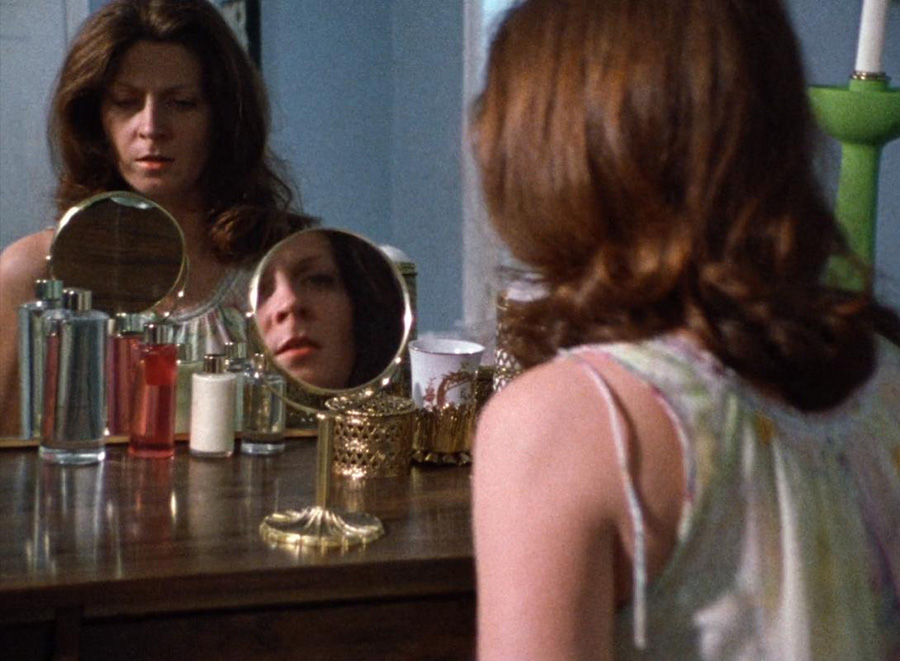SEASON OF THE WITCH
Directed by George A. Romero. 1972. United States.

It's going to be difficult to summarize the plot of George Romero's SEASON OF THE WITCH as there really isn't a plot to be summarized. Romero's film follows a bored, aging housewife named Joan as she grows more distant from her already distanced husband, regards her daughter's affair with a college professor with a tinge of jealousy, dutifully endures the gibbering stay-at-home moms in the community, and engages in endless conversations with her best mate, another bored, aging housewife. This is “GET LIBERATED!” the movie, chock full of messages about female empowerment and feminist agency. It's also “GET BORED!” the movie, because all of the endless dialogue might be fine for proving a point or two, but it would also help if something actually happened along the way.
Apart from a few very effective dream sequences, nothing much happens as the film lifelessly lumbers down it's nearly two hour path. I think the version I own is slightly shorter than some other versions. I know for a fact that Romero's first cut of the film ran over three hours. I would have preferred that version, honestly. There seems to be a great deal missing from the cut of the film I watched. There's a whole subplot about Joan's daughter going missing that is simply dropped ten minutes after it crops up. It feels like Romero didn't quite know what the hell to do with all the footage he shot so he simply decided to keep what was explicit and drop whatever was subtle. That's why the characters in this movie just talk and talk and talk.
But truthfully, some of the conversations the film contains are quite good and the actors, none of whom had anything resembling careers before or after this film, sell the material quite well. The best scene in the entire movie feels like a Lifetime adaptation of Sartre's No Exit, just three people in a room quickly coming to the conclusion that they don't like each other very much, with the male aggressor using alcohol and drugs to force a woman to her breaking point. Scenes like this have an individualistic power to them, but as a whole, there's only so much talking one man can stand, especially when the dialogue is so completely on the nose that it feels like I'm trapped in a room with a street preacher for two hours.
The witchcraft angle (when it finally shows up, that is) more or less feels perfunctory. Witchcraft has long been tied to the idea of influencers, people (usually women) who can control or corrupt the will of others. For a film that expresses such a distinct hatred for patriarchal societal norms, witchcraft is perhaps the single best reversal Romero could have chosen. Joan falls into witchcraft because it offers her a chance to control that which has been decided for her. She's an older woman. The Women's Liberation Movement has left her behind. She's already in her trap, married to a controlling man, saddled with a teenage rebel for a daughter, condemned to the circle of babbling housewives. Witchcraft provides her with the agency she should have but doesn't. She (supposedly) weaves a love spell over the professor, allowing her to regain the sexuality societal custom has robbed from her. She (supposedly) performs a conjuration, a scene that is shortly followed by Joan shooting her husband dead, thinking he was the violent attacker she has been dreaming of lately.
Or was the shooting accidental? I say that Joan “supposedly” casts a love spell and “supposedly” performs a conjuration because I have no idea if these scenes were meant to be taken literally or not. I don't honestly think they were. The idea of “witch”, the label Joan defiantly places upon herself at the end of the film, seems as concrete and real in this film as the idea of “Nosferatu” is in MARTIN. The witch label, if taken figuratively, applies to Joan in a way. Witches were often believed to be women capable of deceiving men, often explicitly targeting them, often with their sights set on their money or their virility. But that is only one view of what a witch symbolizes.
As Joan's husband is dying on the lawn, a voice-over bit of dialogue plays out. The voices belong to men, apparently the cops arriving to the scene. They complain about the damn women doing this kind of shit all the time, not knowing their place, look at this poor guy who did nothing to deserve this. That is one interpretation of Joan's character, one kind of witch, evil women beset on destroying men.
Joan's repossession of her freedom from her husband, her reclamation of her own sexual agency, and her stern refusal to bow to the pre-liberation ideas of what middle age women should be, belongs to the second interpretation of a witch, that of an empowered woman no longer shackled to the will of men. Now if only the rest of the film allowed us any room for interpretation.
I have a feeling that I need to watch the film again and maybe even one more time after that before I actually come to an opinion on SEASON OF THE WITCH. For the most part, I just found the film boring. I think it was well acted and most certainly well directed. It looks like a dry run for MARTIN, a film I consider to be Romero's finest work. But there's no room for interpretation or mystery. Characters speak bluntly and at length. They don't grow or change as the story goes on. Everyone and everything is placed in such a deliberate fashion that the film never feels organic. It feels like a polemic rather than a drama, a diatribe rather than a conversation. And in the end, that is what pulled me out of the film, sat me on the sidelines and left me feeling rather cold.